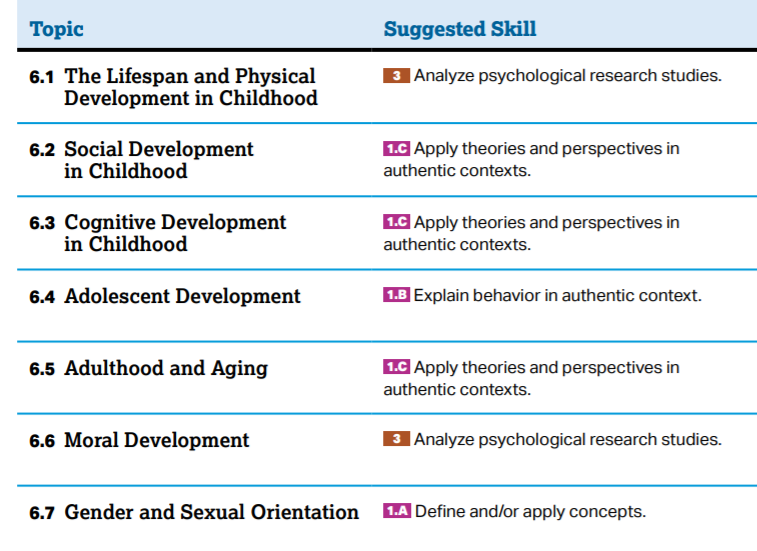Presentations
VocabularyVideos |
Unit 6: Development Psychology
AP Exam Weighting: 7-9% Developmental psychology encompasses the study of the behavior of organisms from conception to death. In this unit, students will learn to examine the processes that contribute to behavioral change throughout a person’s life. The major areas of emphasis in the course include prenatal development, motor development, socialization, cognitive development, adolescence, and adulthood. Developmental psychologists seek to understand how changes in our biology and social situations over a lifespan influence our behaviors and mental processes. Development can be studied from several different perspectives, including biological or cognitive perspectives. Developmental psychologists may focus on one or more developmental periods or the entire course of a lifespan, using cross-sectional and longitudinal research methods. Course Skills: Building on knowledge from earlier units, students will pull together aspects of physiological, cognitive, psychological, and moral development to understand how behavior and mental processes change over the course of a person’s life. This includes the role of adolescent development and the decline of adults as they age. Students will reinforce biological, cognitive, and cultural perspectives studied in earlier units while discussing theories of stage development and continuous development. Students are also introduced to cross-sectional research and longitudinal research designs, which build on the research methods learned in Unit 1. Students will further their understanding of analyzing and interpreting data through these new research designs and in relation to the specific context of developmental psychology. Preparing for the AP Exam: Students should be able to explain physical, intellectual, social, and moral development, along with the development of personality, in childhood, adolescence, and adulthood. Additionally, they should be able to explain the comparison between stages of development. A common student error on the AP Exam is failure to provide specific outcomes about how life experience helps or hinders development. Students should provide a thorough explanation of the relationship between life experience and development within the given scenario. Students tend to discuss the stages of development but fail to expand on the concepts to show mastery. It is important to a student’s success on the exam that they write complete thoughts with cogent, accurate information. Teachers can provide students with opportunities to write about development at each stage of life in real-world contexts. Students will also answer questions related to research methods, including validity, ethics, and correct method of study. They may be asked about experimental design and should be prepared to answer questions such as What are the flaws in a research study? Would this design pass IRB? What is the appropriate method for a research question? |
